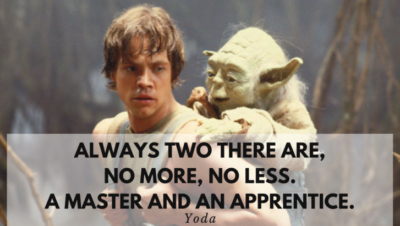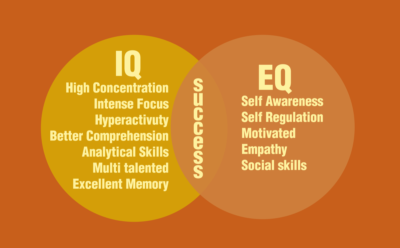
People often confuse intelligence and wisdom. While intelligence can open doors for us in life, it cannot bring the peace, balance and sense of morality that comes from having wisdom. Learning the four key differences between intelligence and wisdom will make it easier for you to figure out the exact steps you need to take to acquire and embody each trait. (Estimated reading time: 6 minutes)
“Knowledge comes from learning. Wisdom comes from living.”
— Anthony Douglas Williams
The Sage is a well-known archetype in our culture.
They are often portrayed as wise and knowledgeable. They offer guidance through storytelling and sagely advice. In many cases, these revered figures possess specialized skills which they teach to their apprentices.
In the world of fiction, there are countless examples of the Sage archetype: Yoda from Star Wars, Morpheus from The Matrix, Gandalf from the Lord of the Rings, Splinter from Teenage Mutant Ninja Turtles, Rafiki from the Lion King, and Miyagi from the Karate Kid. In our own lives, we may have a grandparent, relative, friend, teacher, or mentor who plays that role.
The Sage is truly a powerhouse, not only because of their gift of foresight, gained through life experience but also due to the vital role that they play in training a hero to prepare them on their quest to find their destiny. According to Carl Jung, this wisdom is an innate spiritual aspect of our unconscious mind which we can access if we’re open to it.

Before we learn how to tap into our inner sage, let’s first unpack its two essential components: wisdom and intelligence. These words are often seen as interchangeable. The truth is that each one represents a distinctly different type of knowledge.
The ancient Greeks sensed this variance and therefore did not limit the word ‘intelligence’ to a single faculty. Instead, they created a rich vocabulary to describe multiple forms of intelligence:
Nous (mental activity), Phronesis (good judgment/common sense), phrontis (reflection), metic (cunning/practical wisdom), gnome (wisdom), and techne (technical skill).
Today, we’re more conscious of these differences, and we accept the prevalence of these various forms of intelligence. Parents, academic institutions, and businesses are waking up to the fact that being book smart, or having academic intelligence does not guarantee a life of happiness and fulfillment.
Top grades, fancy degrees, and specializations that lead to worldly success do not mean anything if not accompanied by the life skills and emotional intelligence that make a person self-aware, intuitive, empathetic, and mature.

Unlike the intelligence associated with acquired knowledge, wisdom is an innate trait. Although wisdom is enhanced by processing life experiences, there are some ‘old souls’ who are naturally gifted with this instinctual awareness. These are the young sages who we see as being ‘wise beyond their years.’ They have an inherent knowledge of life’s deeper mysteries.
While our temperament, genetic predisposition, and upbringing all have a significant impact on our ability to synthesize wisdom, it doesn’t mean that it’s out of our reach. The first, crucial step is acknowledging your wiser self and taking the steps needed to nurture it by committing to certain practices.
I know for a fact that this works because I did not grow up with strong mentors who offered me the counsel I needed to make well-thought-out decisions. At some point in my life, I sensed the absence of this much-needed guidance, which prompted me to reach out for books, consult experts, attend workshops, and sign up for courses to boost my ability to discern.
This taught me that everything can be learned, as long as we make a conscious decision to open ourselves to the process and seek the information that we need to evolve. We’re fortunate to be living in the information age, where all kinds of knowledge is at our disposal. When you follow your curiosity and adopt the learner’s mindset, you’ll hone your instinctual capacity to be wise.
Understanding the nuanced difference between intelligence and wisdom will make it easier to figure out the exact steps you need to take to acquire and embody each trait.
Here are four key differences between intelligence and wisdom:
1. Intelligence is a mental strength – wisdom is a moral and spiritual one: Intelligence is part of our mental faculties and is, therefore, a logical and rational trait. Wisdom is the higher perspective – the intuitive knowledge that you gain after assimilating things within your mind. Intelligence makes you sharper and smarter. It will make you more adept at solving problems, crossword puzzles, and interpret facts. Intelligence can be developed through reading, enrolling in school and university, self-study, and honing your skills.
Wisdom allows you to understand subtle nuance, truths below the surface, and give you the ability to see the big picture when making decisions. Wisdom will guide you to live a life based on your values and ethics. It only comes from self-reflection and connecting the dots based on what your life experiences.
2. Intelligence can lead to worldly success – wisdom leads to personal success: Intelligent people often have specialized knowledge they have gained through training and experience which boosts their merit as a professional. They can use their skills and expertise to develop strategies in furthering their careers, and they become sought after by potential employers and customers alike.
Wisdom, on the other hand, does not always lead to worldly success, unless that wisdom is channeled into commercial enterprises. Examples of this may be gurus who author books, speak at events, or mentor and coach, etc. More often, wise people benefit from their wisdom in the form of inner wealth. They are more likely to be happy, balanced, resourceful, generous, kind, and respected by others.
3. Intelligence doesn’t always humble you – wisdom does: Because intelligence is a function of the mind and the ego, if not tempered with humility, it can cause arrogance. We’ve all met a ‘smarty pants,’ the kind who puts up a front of being a know-it-all, annoying people in the process. Knowledge without humility is often self-defeating because it causes a person to be vain and lose the support of others.
Wisdom humbles you because you understand your place in the grander scheme of things. Wise folks have the maturity to know that no being is superior to another and that we’re all equal regardless of our status. They know that they aren’t the center of the Universe and that kindness is what matters most.
4. An intelligent person isn’t always wise, but a wise person is always intelligent: Being book smart or having a lot of degrees and accolades does not make you wise by default. All these qualifications and knowledge will furnish you with the knowledge that’s needed to excel in problem-solving, making observations, critiquing, and strategizing but it doesn’t induce the sensitivity to live from the heart and perceive the deeper dimensions of life.
A wise person is intelligent because they have elevated levels of spiritual intelligence (SQ) and emotional intelligence (EQ) and they draw from this to digest life’s truths and to make astute observations that could benefit other people.
All religious and spiritual teachings extol the virtue of wisdom. It’s seen as a spiritual superpower – an evolutionary portal which leads us closer to elevated forms of consciousness and transcendence. In the real world, wisdom not only results in more joy and peace in life, but it inspires you to demonstrate kindness, and compassion to all living beings.
All my best on your journey,
Seline

Reflection Question: Do you consider yourself to be an intelligent or wise person? Which one do you feel that you need to work on more?
Did you like this post? Sign up below and I’ll send you more awesome posts like this every week.

Hi seline – I was always taught even as a child that knowledge is like book learning and is what we get from the school where wisdom is world learning and is what we get from living life and being a human in the world today. Both are needed and they can and should complement each other to make you a well-rounded person. But many people today are getting hung up on book learning and knowledge and not the true learning that comes from living and that brings wisdom. You can know how to change a flat tire fro reading books but until you actually do it you won’t really know how to change a tire.
That is what it thinks the difference between knowledge and wisdom is like!